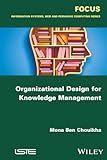Organizational design for knowledge management
By: Chouikha, Mona Ben
Material type: BookSeries: Information systems, web and pervasive computing series.Publisher: London : Wiley, c2016.Description: xiii, 173 p. : ill. ; 25 cm.ISBN: 9781848219229Subject(s): Knowledge management | Organizational learningDDC classification: 658.4038 CH OR
BookSeries: Information systems, web and pervasive computing series.Publisher: London : Wiley, c2016.Description: xiii, 173 p. : ill. ; 25 cm.ISBN: 9781848219229Subject(s): Knowledge management | Organizational learningDDC classification: 658.4038 CH OR | Item type | Home library | Call number | Status | Date due | Barcode | Item holds |
|---|---|---|---|---|---|---|
| REGULAR | University of Wollongong in Dubai Main Collection | 658.4038 CH OR (Browse shelf) | Available | T0058418 |
, Shelving location: Main Collection Close shelf browser
Includes bibliographical references and index
Introduction ix Part 1 A Systemic Approach to the Organization Based on Knowledge Management and its Tools 1 Chapter 1 Theoretical Anchoring of Knowledge 3 1.1 Individual knowledge and skills 4 1.2 From individual learning to organizational learning 9 1.3 Knowledge management 16 1.4 Knowledge management systems 23 1.5 Communities, teams and knowledge management 26 1.6 Knowledge management and cultures 31 Chapter 2 The Design of the Learning Organization 37 2.1 From the systemic approach to the organizational design 37 2.2 Proposal of an organizational design for knowledge management: "learning organization design" 44 Part 2 Emergence of a New Design: that of the Learning Organization 61 Chapter 3 Real-World Access Methodology 63 3.1 Methodological choices 64 3.2 The field of research 67 3.3 Data collection 85 3.4 Processing of the collected data 92 Chapter 4 Case Study 99 4.1 Design of the learning organization SCCC (before the merger) 99 4.2 Design of the learning organization SCCC (period of merger with N) 108 4.3 Design of the learning organization NSN (post-merger) 114 4.4 Overview of the three phases 122 Chapter 5 Emergence of a New Organizational Design 127 5.1 Emergence of a design of the learning organization 127 5.2 Emergence of a new organizational design in view of the impact of culture 130 5.3 Emergence of a new organizational design when faced with knowledge boundaries 131 Conclusion 139 Bibliography 147 Index 171.
Information and communication technologies have increased their share of services in contemporary economic exchanges. We are witnessing a transformation of modern economies characterized by a predominant role of information and knowledge in the production of wealth. In order to make this intangible resource bear fruit, organizations are looking for ways, methods, procedures, processes and technical solutions to efficiently manage knowledge Within a framework of research into synergies and resource interdependence, organizations also rely on strategic alliances (joint venture), mergers or other legal forms of association that have an impact on knowledge management. This book explores the range of knowledge management techniques.






